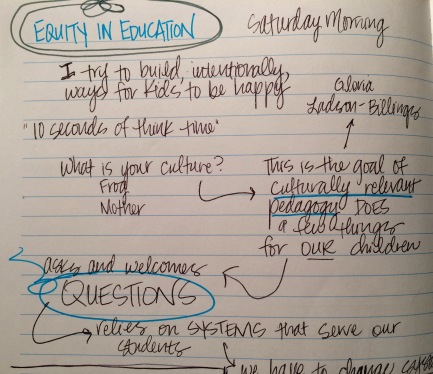“Questions are at the heart of it all. Just start with the question.”
These were the first words I heard at NCTE, and they were from the mouth of our beautiful mentor, Penny Kittle.
Penny was opening a workshop honoring Tom Newkirk, a true beacon of hope in the sometimes desolate landscape of education. A bevy of thinkers–Gretchen Bernabei, Ellin Keene, Tom Romano, Jeff Wilhelm, and more–spoke about the ways Tom Newkirk had helped them grow as teachers, thinkers, readers, and writers.
And you know what they all had in common?
Questions.

Notes from Cornelius Minor’s portion of a session on equity in education
Ellin Keene, whose books were edited by Tom Newkirk, said that he never “wordsmithed” her writing. Instead, he wrote questions in the margins. She called him the “rare provocateur who asked questions because he genuinely wanted to know the answer.”
Jeff Wilhelm, who wrote book after book that was inspired by Newkirk’s work, said that he always found his book topics by lingering on a question he was wondering about.
Tom Romano framed Newkirk’s thinking in a “says who?!” style: the Common Core says narrative writing is for sissies? Newkirk replies, “SAYS WHO?!” and writes Minds Made for Stories.
Vicki Boyd, Tom Newkirk’s editor and the general manager of Heinemann, said that Tom’s words led her to believe we should all “get curious about the stories that lead people to their stances and beliefs.” We must ask questions to understand one another.
Questions prevailed as a theme: when speakers talked about their process for discovering their topics or planning their talks, questions were at the heart. When I jotted something powerful in my notebook, it was usually a question.

It’s not about the answers, I was starting to notice everyone saying. It’s about the questions.
Maybe we’ve known this for a while, and it just took some time for me to find the red thread of questions running through our work.
When I was planning for NCTE, I framed my thinking around questions.
Yesterday, Amy wished us “joy in the journey” in her post synthesizing her learning at NCTE.
I wrote about valuing process over product in this post.
Amy wrote about it back in 2013.
And apparently there’s a great new book out by Katherine Bomer called The Journey is Everything (sorry I missed that; it came out April 22, and I was busy having a baby right then…brb while I add it to my Amazon cart).
It is, apparently, about the journey, and the process, and the questions…not the finish, or the product, or the answers.
We spend so much time wondering how to get it right, when what’s important isn’t the getting it right part. It’s the wondering.
And apparently I’ve known that all along, but I like to keep forgetting to keep questions at the heart of my thinking and teaching.
So, as we race toward the end of 2016, I will try to start with questions in everything I do: my talk with students, instructional design, grading, and even my ever-fluctuating educational philosophy.
I have the pleasure of being able to give only feedback, and no grades, on my students’ final projects for the semester. These large-scale assessments are meant to go into their final portfolios that they’ll defend before graduating, so I am unencumbered by rubrics and numbers. I’ll focus on the questions they ask, and ask them some of my own, as I read their work.
As I think about planning for next semester, I’ll wonder how I can get more students questioning themselves, one another, and all the many routines and philosophies they see around them.
And as I move forward with my writing here at TTT, I’ll remind myself, every time I sit down with my notebook: start with a question.

What questions are you asking? Please share in the comments. (Or ask some questions of your own!)
Tagged: Readers Writers Workshop

[…] the best approach I’ve found so far in helping students question their own writing. (See Start with a Question for more on how questions aid writers.) We can give tips and clarify process — and help […]
LikeLike
[…] this thread), assessments, mini-lessons, and how to match students with the just right books. We start with questions and often end with them as […]
LikeLike
[…] So, in the true 3TT fashion, I’m writing a blog post not to offer solutions but rather to ask all of you–my wonderful, smarter-than-me colleagues–a question. […]
LikeLike
[…] I gave a lot of positive, specific feedback in return for their risk-taking, asked them lots of questions to keep them thinking, and in turn, I saw them begin to take more risks in their thinking and […]
LikeLike
[…] my desk isn’t my Everest. I’m not that far gone. But, per Shana’s inspiration to start with a question, I was thinking about what needs my attention the most right now. With 86 minutes to plan, grade, […]
LikeLike
Love this! Started a new writing journey today with the questioning technique Shanna Peeples modeled in her visit here last year. Hoping to take these questions into a multi-genre project like Kittle & Gallagher talked about at #NCTE16! I’m fascinated already by the things my students question and wonder about. We’ll see where it leads!
LikeLiked by 1 person
That’s awesome! If you want to learn more about multi genre, check out Tom Romano’s work. I’ve devoured all of his books to help me understand it better!
LikeLike